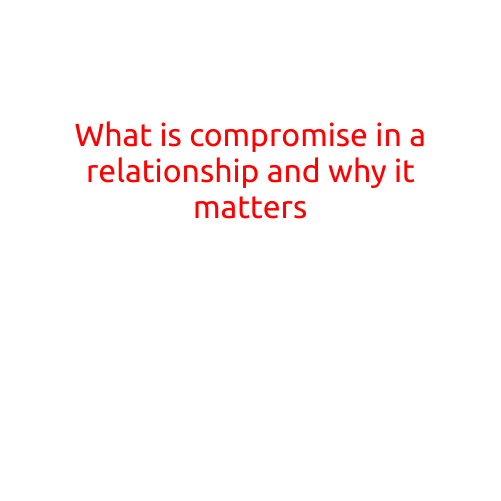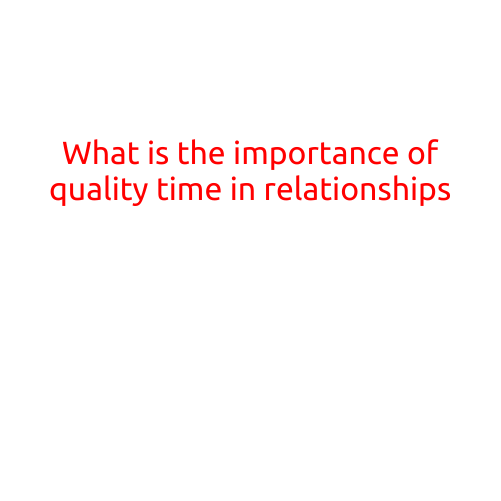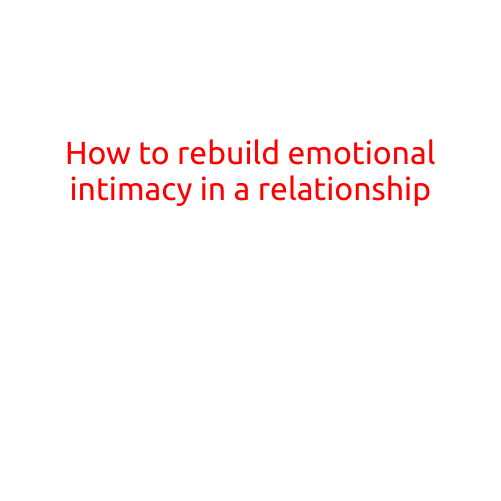
What is Compromise in a Relationship and Why it Matters
Compromise is a vital component of any successful relationship. It’s the ability to find a middle ground, to settle for something less than what you want, and to work together as a team. In a romantic partnership, compromise is essential for building trust, fostering communication, and ensuring a strong and lasting bond. In this article, we’ll delve into what compromise means in a relationship, why it’s crucial, and how to master the art of compromise.
What is Compromise in a Relationship?
Compromise in a relationship refers to the act of finding a mutually beneficial solution that satisfies both partners. It’s the willingness to adjust your desires, behaviors, and expectations to meet each other’s needs. Compromise doesn’t mean one partner gets everything they want, while the other gets nothing. Rather, it’s a collaborative effort to find a solution that satisfies both parties.
Imagine you and your partner have different preferences when it comes to television watching. You love binge-watching your favorite shows, while your partner prefers to watch live sports. A compromise might be to take turns selecting the evening’s entertainment. This way, you both get to enjoy your preferred programming at least some of the time.
Why is Compromise Important in a Relationship?
Compromise is essential in a relationship for several reasons:
- Resolves Conflicts: Compromise helps to resolve conflicts and avoid stalemates. When both partners are willing to bend and find a middle ground, conflicts become less intense and less frequent.
- Builds Trust: Compromise demonstrates trust in each other’s interests and needs. When you’re willing to make concessions, it shows you respect and value your partner’s opinions.
- Encourages Flexibility: Compromise promotes flexibility and adaptability in relationships. It helps partners develop the ability to adjust to changing circumstances and prioritize the needs of each other.
- Fosters Communication: Compromise requires effective communication. When both partners are open to finding solutions together, it strengthens the communication channels in the relationship.
- Enhances Emotional Intimacy: Compromise can bring partners closer together by creating a sense of unity and teamwork. It’s an act of love and respect, demonstrating a willingness to work together for the benefit of the relationship.
- Promotes Long-Term Success: Compromise is essential for building a strong, lasting relationship. When couples are willing to work together and find solutions, it creates a foundation for a successful and fulfilling partnership.
Tips for Mastering Compromise in Your Relationship
- Communicate Effectively: Practice active listening and express your needs and desires clearly.
- Be Willing to Adapt: Be flexible and open to finding a middle ground.
- Avoid Assumptions: Don’t assume your partner will always agree with you. Instead, ask open-ended questions to understand their perspective.
- Respect Each Other’s Boundaries: Recognize and respect each other’s limitations and boundaries.
- Practice Empathy: Try to see things from your partner’s perspective and avoid getting defensive.
- Make Trade-Offs: Be willing to make trade-offs and find a solution that works for both partners.
In conclusion, compromise is a vital component of a successful relationship. It’s the ability to find a middle ground, work together as a team, and build trust and communication. Mastering compromise requires effective communication, flexibility, and a willingness to adapt. By embracing compromise, you can strengthen your relationship, build a stronger bond, and create a foundation for a long-lasting and fulfilling partnership.





